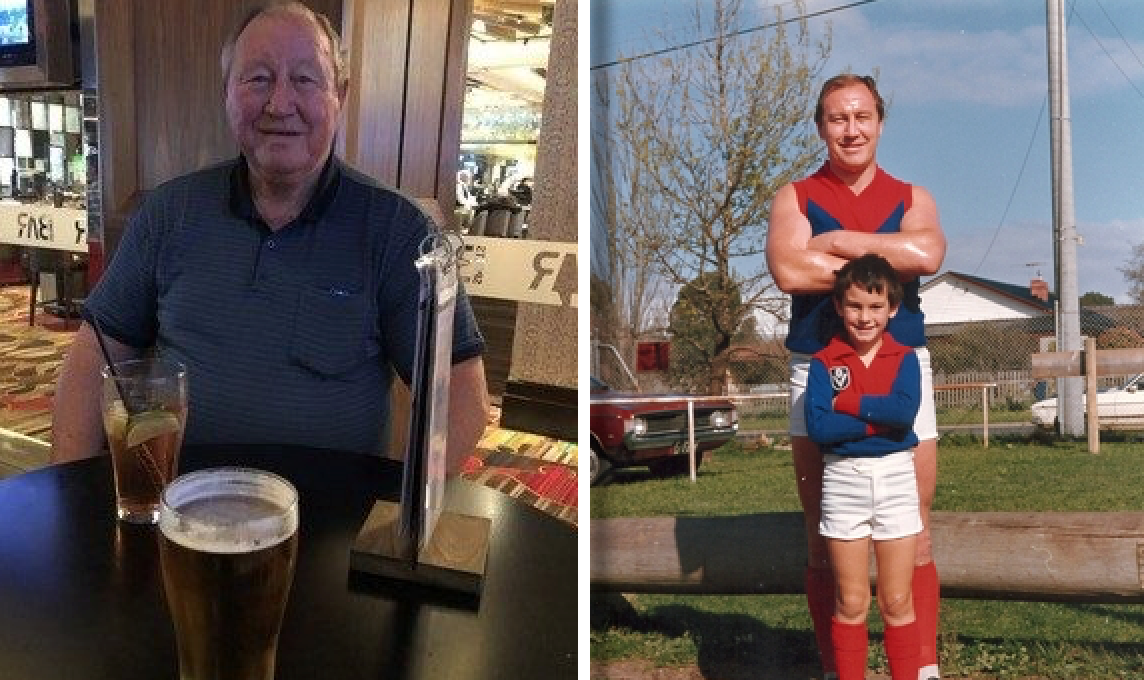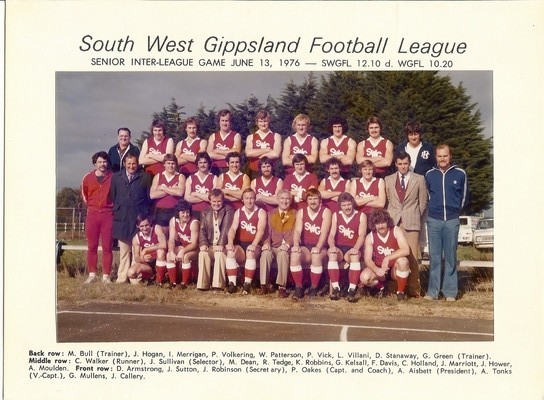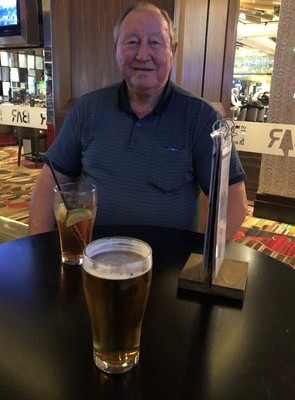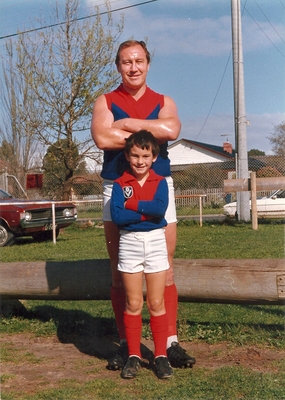
Peter Oakes forged a lifetime in sport throughout the south-east and into Gippsland, before following his family out to Melbourne’s western suburbs to start a new chapter with his darling wife of 50 years, Pauline. Peter recently caught up with sports editor RUSSELL BENNETT in the sports bar at Crown Casino to recall the glory days – which included the famous 1968 Longwarry premiership…
Russell Bennett: Tell me about where your sporting journey begins…
Peter Oakes: I started at Warragul as a kid. I played footy in the under-19s there when I was 12, because there were no juniors then.
RB: What? Hold on… you played in the under-19s when you were 12?
PO: Yes, that’s right. Under-19s was the only junior side there was, and I was a pretty big kid for 12. I would have been maybe 5’9” even then, and I was always a pretty solid kid. We played as a junior team in Noojee. In those days Noojee didn’t have any kids, so Warragul provided them with a junior team and we played in the Ellinbank league.
It was hard, but my dad was pretty good. He used to say to me “Don’t go in there – they’ll kill you. Get on the outside”. I played on a wing and it probably taught me that I could make position, playing on players who were 18 or 19.
RB: So you had to stay pretty disciplined against them, Peter?
PO: Exactly, Russ. I had to stay in my position and I learned a fair bit that way. I learned on the run – literally. At that stage I was right into my boxing as well. I did a fair bit of that early on.
RB: And that’s hardly surprising, given the family connection you had to the sport…
PO: Well, yes – (former World champion) Lionel Rose was my brother-in-law, and my dad trained a team of Aboriginal boys in Warragul. It probably helped me along a lot because I trained more than the average boy in those days. The average bloke in those days would go to work and come down to train two nights a week, but I was in a boxing gym too at least three nights a week.
RB: Tell me more about your under-19 football journey, Pete…
PO: Well my father coached the under-19s at Warragul at one stage there, and I played my first game in the seniors at Warragul at 15 – this was in the Latrobe Valley days when the competition was very strong. They won a lot of the country championships and those sorts of things back then.
When I was a young kid – younger than when I started playing footy – as a family we used to travel to Melbourne every week to follow Collingwood. We used to go down and come back on the train, and we’d go to all the local grounds – Windy Hill, Victoria Park, Arden Street, all of those.
In my leaving year, I’d turned 15 – I was going to Warragul High – and we went down and had a look at a couple of practice matches at Collingwood and we met a family there, the Jenkin family. Graeme Jenkin, or ‘Jerker’, was the one Jesaulenko took the mark over in the 1970 grand final.
We became very friendly with them, and Graeme asked me to come and have a run in one of the practice games.
I came down and had a good couple of games in the 12 o’clock game and made their under-19 list.
RB: And you were still only 15?
PO: That’s right, but I’d already had three years of playing in the under-19s back home.
I said to Dad that I wanted to play, so I came down to Collingwood. My father worked on the railways so I was very lucky, I got a job as a junior clerk in the March.
They’d had their normal intake already, but one kid left and I took his place.
I left school and went to town to play footy and work on the railways from head office in Spencer Street. I boarded with my dad’s sister in Mitcham, and everything went really well for a little while…
RB: So what happened?
PO: Well they found out I was only 15, Russ! (laughs). They put me in the under-17s then instead.
RB: So you never actually told anyone about your real age when you went down there?
PO: No, not at all.
RB: In your own mind, you would have been ready – wouldn’t you?
PO: Well I’d already played against kids that size for years, so I was thinking what difference does it make how old I am?
RB: Did you feel like, at the time, you would have been prejudiced against if they found out?
PO: I don’t really know, to tell you the truth Russ, but I went back to the under-17s and played four games and it was like playing against little kids. I think I kicked 36 goals playing in the centre, so they put me straight back up into the thirds.
I ended up playing as first rover in the under-19s at Collingwood and we had some pretty good players at that stage – we had Teddy Potter, who went on to play about 180 senior games; Peter Boyne, who was centre-half back; Graeme Jenkin was first ruck; Len Thompson was second ruck; Doug Searl, who went on to coach Fitzroy, was centre-half forward …
RB: Wait, hold on a second Pete, Len Thompson – who went on to win the 1972 Brownlow – was second ruck?
PO: (Laughs) Yes, that’s right. It was a pretty good side, but we didn’t do as well as we might have in the first year or so. We made the grand final in the under-19s in 1964 against Melbourne, and I played in that one.
We were a bit stiff that day – we won the second semi by about 10 points and Collingwood had the firsts, seconds, and thirds in the grand final and we had some injuries so some of our good players went up to the reserves and we just got pipped in the grand final. If we had those players playing for us instead we might’ve won that one.
RB: So what happened from there?
PO: In ’65 I was appointed captain of the under-19s, but it was a bit of a funny one back then – whoever brought people down with them got a go. I got a phone call on the Thursday night at Warragul to say that, seeing I was captain, I was assured of my place but they were bringing another bloke down to play in my position, just for the first game, and if I wanted I could play with the Parkside amateurs.
I said I wasn’t too keen because I lived in Warragul… they didn’t even know.
RB: Wait, so they had no clue about your real age or where you lived?
PO: That’s right. I got transferred through work back home, so I hitch-hiked for three years to training two nights a week from Warragul, and on Mondays I used to get a ride from a bloke named Don Logan, who was doing a course at Swinburne Tech as an accountant.
I used to get a lift to training from him – he’d drop me off right at the ground on the way past. But some nights I’d have to walk 10 kilometres in the rain and I’d get to Collingwood and I’d be saturated before training even started.
I used to catch the train at Victoria Park to Princes Bridge, Princes Bridge to Dandenong, ring my mum and dad from the phone box at Dandenong station at about 8pm, and they’d come and pick me up. I’d be there until about 9 o’clock, and in those days there were no real takeaway shops or anything like that so you might get a pie from a milk bar that’d been in the pie warmer all day. So, I wouldn’t have dinner some nights until about 10.30.
After doing that for three years, I’d just about had enough (laughs), so when they said I could play at Parkside amateurs, I thought bugger that I’ll go back to Warragul.
RB: So how old were you, Pete, when you went back home to play?
PO: I would have only been about 18. I played the first game when I was appointed captain of the under-19s at Collingwood and was named best-on and won a shirt (laughs).
RB: That’s fascinating to me. On the one hand, they clearly thought of you very highly, but on the other hand the reality of the game back then basically edged you out…
PO: That’s right. It was about who you knew, and who you could bring into the club with you. So, I went back to Warragul and had a really good year in the Latrobe Valley competition (a precursor to the Gippsland League). There were a lot of players there in that competition who played for Carlton, Footscray, you name it.
I had two years there and I was runner-up in the best and fairest in my first year back. In fact I won the Gazette sports writers’ award for the best player at Warragul, and then I got transferred back to Melbourne. I couldn’t believe it.
By the time I’d get back out of the city for training it’d be dark and we didn’t have lights at the ground back then. It would have been 6.45 by the time I got to training, so I ended up going to Bunyip in the West Gippsland league because I was able to drive my car to Bunyip in the morning and catch the train in from there.
I was going out with a girl from Bunyip at that stage and I played with them for $20 a game, which was fairly good money in those days.
RB: But then there was another twist, wasn’t there Pete?
PO: Well at the start of the 1965 season they said they didn’t have any money left. I was getting married the following year so I ended up going to Longwarry instead with Eric Guy. I played in that 1968 premiership side at Longwarry, which was the last one before they broke the drought this year.
RB: Clearly you would have kept a very keen eye on that result, given how long it’d been between drinks, and the fact you were part of the last premiership side…
PO: Yes, well I went up last year – for the game they unfortunately lost – and I went this year to Yarragon too.
Gee there was a big crowd this year. There were about seven of us 1968 premiership players there. (Hawthorn icon) Peter Knights was in that ’68 side, as well as Ray Walton, who played for St Kilda … there’s only about 13 of us left though.
It was just fantastic to see those boys win it this year.
I went to the one out at Warragul about four years previously when they got beaten by Buln Buln as well.
RB: How long did you play at Longwarry for in the end?
PO: I played in a couple of grand finals for them and was runner-up in the best and fairest four times in the five years I played there. The first year I went to Longwarry was in 1968, the year we won it, and that’s the only premiership I ever played in.
I played in seven grand finals and I coached four clubs into grand finals, and that’s the only one I ever won.
I was lucky though – when I went to Bunyip, (West Gippsland football legend) Mike Breheny was the coach. He recruited me, and my dad – years and years prior – played at Bunyip. I got invited to go on the trip they went on in 1967 (to the Northern Territory), but I couldn’t get leave from the railways. As it turns out, five of those boys were killed, plus the pilot. I was just so lucky I couldn’t go, in the end. I would have died too.
When I left Longwarry, I got married and lived at Chelsea Heights.
RB: Where did your footy take you then?
PO: Well I got approached by Dromana. My dad’s brother was the president – I think he was the president for 26 years straight, Eric Oakes. I went there and coached them for two seasons in my mid-20s.
Prior to that I’d coached the Warragul under-15s when I was 18 and I coached the Longwarry reserves when I played in the seniors.
I was a bit stiff though, Russ. I didn’t know they’d lost 17 senior players after winning the premiership the year before, so I ended up coaching the seniors and the under-17s at Dromana. They were badly struggling for numbers, so it was pretty hard.
I was living at Chelsea Heights, and after that they chased me and I coached them in the South West Gippy league.

RB: And how’d you go there?
PO: I coached them to two grand finals and we got beaten both times by Berwick, which was a very, very strong side back then. I remember in the first one we played against them they had 12 former AFL or VFL players in the side – Frosty Miller, the two Nisbet boys, they had a really good side.
I ended up coaching Chelsea Heights for about five years – six years I think – and I was approached by a club up in the Bass Valley, Bena before they became Korumburra-Bena later on.
I got fairly big money there, but I’d never played for money before. I’d coached Chelsea Heights for $50 (a game). When I was at Bena I got probably $200 a win, and a $180 a loss and we only lost two games in the first year! (laughs). We made the finals for the first time in, I think, 20 years.
I was 32 at this stage and won the South West Gippy league best and fairest two years running before I went up there. I was a centreman, ruck-rover.
In my second year at Bena we made the grand final for the first time in 30 years, but we lost that one, and the following one too.
I went back as a player after that – after I’d stopped coaching there – for a season, and then I was appointed the non-playing coach of Chelsea Heights at 39.
RB: So as your career progressed, so did your inside midfield game?
PO: Yes, I played first rover or on ball a fair bit, but when I started I was only a kid so I played outside a bit more, on a wing.
RB: And you were playing until you were 39?
PO: Yes, nearly 40 when I finished up. When I was appointed the non-playing coach at Chelsea Heights I ended up playing every game! (laughs). They struggled for players too back then.
RB: How many games did you end up on, Pete? I’ve heard it’s an incredible number…
PO: It was 459 senior games by the end. I missed three games in my entire career.
RB: You’re s******g me! What for?
PO: I got a broken jaw against Heyfield – I got knocked out at the opening bounce. I found out later on this big ruckman had a plaster cast on his arm with a bandage over it. My dad was always pretty tough, and so I came into the rooms at half-time and didn’t know where I was.
RB: Wait… you kept playing throughout the first half?
PO: Yeah, I kicked six goals and I couldn’t even remember playing. Dad said I was as weak as water – he said the bloke knocked me down with a back-hander and I just lay there like a baby.
Dad always used to say “if you lay there on the ground, we’re a man short – get up”. He was very tough.
Anyway, I missed three games from the broken jaw that day and the umpire got knocked out by a trainer in the same game! There was an all-in brawl. One of the trainers ran on, the umpire told him to get off, and he just hit him and knocked him out.
We ended up there waiting for half an hour for another umpire to come and finish the game. It nearly finished in the dark! (laughs)
It was at Warragul at the showgrounds – it was the weekend that St Kilda moved to Moorabbin.
RB: So the only three games you missed through your entire career were from that one incident?
PO: That’s right. I had broken fingers, broken ribs, corkies, turned ankles – that sort of thing – but I played through them.
The incredible thing is I never did a hamstring or a groin.
When I first went to Bena I did an ankle in a practice game and they said, as the new coach, I’d better play on it – so I told them I’d play out of the goal square. I ended up playing that first season at full-forward and I won the league goal-kicking in Bass Valley.
RB: And you did that at 5’9”?
PO: Yes, my dad was a big bloke and they always reckoned I was going to be a big kid because he was about 6’1” and 16-stone. I filled out, but I just never shot up.
After my playing career I coached my young bloke at Chelsea and I coached the under 11s, 12s, 13s, 14s, 15s, 16s, and 18s. I also coached the Bonbeach under-18s into the finals too before I gave it away.
My young bloke ended up playing 100-odd games at Chelsea, and about the same at Rye.
RB: When you came through as a player in your era, that was clearly a bloody tough brand of footy that you had to play. That must’ve sorted the men out from the boys pretty quickly…
PO: Absolutely. You didn’t have a choice. I just never let anyone hit me without copping something back. That was just the way it was. A few players from different clubs in the Bass Valley days tried to have a crack at me, and I got a pretty average reputation from a few of them (laughs). I’d call their bluff.
RB: So that’s the footy side of things, but what about your boxing? I know you could handle yourself…
PO: I had about 12 amateur fights and had great fun. I lost one, drew another, and won the rest. This was before I was 18, but I was just too big – I would have been fighting heavyweights if I went further and I didn’t have the reach. I fought (Trevor) ‘Stretch’ Anderson – who later became the Australian professional heavyweight champion – in the amateurs for the Victorian middleweight title and got disqualified for holding and hitting. He was 6’6” though! How else could I get around him? (laughs)
In the amateurs you weren’t allowed to duck, either – you had to block the punches. I was lucky with my boxing, though – I trained with Lionel (Rose). I reckon I would have boxed 2000 rounds with him over the journey.
My dad trained and had Lionel, my brother-in-law – he married my sister; Harry Hayes, Gary Mullett…
RB: I know Lionel was your brother-in-law so you probably don’t think about it like this – or maybe you do now looking back – but that had to have been a surreal time for you back then…
PO: It was unbelievable, Russ. We had Arthur Thomas too – he was a top lightweight who fought the first main event on TV Ringside.
RB: Did you know at the time what an experience that was, or was it something that you worked out in hindsight?
PO: No, I just grew up with it. Lionel was the best man at our wedding, so boxing was a big part of my life. I even trained Harry Hayes for the Commonwealth flyweight title at the Chevron because dad couldn’t do it – he was away. That was a real thrill.
RB: So you went back and coached footy at Chelsea Heights after you finished playing, and you coached after that – but what brought you out to the western suburbs of Melbourne, where you’re living now?
PO: I’ve been married to Pauline for 50 years and got three kids. My eldest daughter came over and taught at Hoppers Crossing, and she got married and her husband played for Werribee Centrals. My other daughter went over for a weekend to see her and she ended up meeting a bloke who was a footballer at Werribee – 6’6” and was a fantastic player. He ended up winning the Fothergill-Round Medal (now the Fothergill-Round-Mitchell Medal) – his name is James Puli.
RB: So the reason you ended up in the west was because your family did?
PO: That’s right. All the kids live near me now, and the grandkids. I’ve got a grand-daughter, Maddi (Puli), in America on a basketball scholarship in Fort Worth, Texas. They chased after her for three years and she went over there and she loves it. We speak to her all the time over the phone.
RB: It’s really incredible how engrained sport is in your life – from when you were a kid, all the way up to now…
PO: Exactly. All the kids played sport too.
RB: You must be so proud of that…
PO: It’s unbelievable – sport provides you with these fantastic opportunities in life. My whole life has been in sport.
RB: Pete, I reckon that’s a pretty good note to end on. Thank you mate – I’ve loved the chat.
PO: Cheers, Russ.










